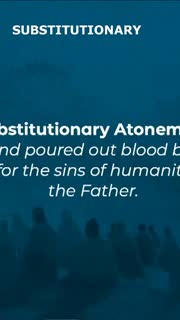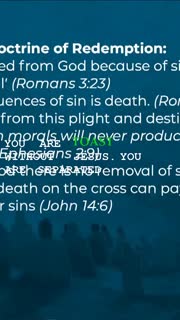The Great Exchange: Jesus' Sacrifice and Our Redemption
Devotional
Sermon Summary
Bible Study Guide
Sermon Clips
1. "When you all lift your voices and sing together in worship, there is a tangible. Presence of Jesus in this place. And it's good to be with you in his presence. Well, today we're going to return to our study in the gospel of Mark. It's been an amazing series. And we find ourselves in chapter 15." [01:42] (17 seconds)
2. "The great exchange. Jesus takes our place. He was bound so we go free. He laid down his life so that you can have life. It is the great exchange. There's an old chorus I learned. We used to sing growing up in church. And it was kind of a boom chuck tune. But the lyrics are very powerful and encapsulates all that we're talking about today." [08:21] (19 seconds)
3. "Substitutionary atonement. There's the definition. Jesus' sinless life and poured out blood became the perfect sacrifice to atone for the sins of humanity. Reuniting us with the Father. You can break down the word atonement to say at-one-ment. Because what happened on the cross is the division that happened between the Creator and his creation. Between the Father and his children. Jesus went to bring us back into fellowship with him." [08:59] (28 seconds)
4. "The bad news is the great exchange. That Jesus came and said. Whosoever will may come freely. You can enter in right now and receive the free gift of God's grace. And be redeemed. That is the good news." [13:58] (12 seconds)
5. "Shame is a condition of the soul. That actually begins to shape our identity. Shame is different than guilt. Guilt is actually a gift that informs your conscience. When you've done something wrong. And you need to fix it. But shame becomes our identity when this happens. Based on our sins. Our failures. Our losses. Our regrets. We begin to believe that we're not worthy. That this is the character of who we are. And we carry shame. And we can carry it throughout our life." [16:13] (29 seconds)
6. "You are toast without Jesus. You are separated from God. And you can't find your way back to him. That's the bad news. The good news is the great exchange. That Jesus came and said. Whosoever will may come freely. You can enter in right now and receive the free gift of God's grace. And be redeemed. That is the good news." [13:58] (21 seconds)
7. "Jesus paid the full price. You don't have to stay in brokenness. You don't have to stay in that area. Where you feel ravaged by the past. A healer has come. In Jesus name." [20:55] (10 seconds)
8. "Jesus took a crown of thorns. Upon his head. Now a few years back. Don and I were on a trip with some friends. And we were in Israel. And we were at the garden of Gethsemane. And we struck up a conversation with the gardener. And that conversation with the gardener. Led us to a no access area beyond a gate. And so we walked back with him." [22:07] (19 seconds)
9. "The chastisement. Or the punishment inflicted. That brings us peace. Was upon him. Lean in. Today. If you are suffering from anxiety. Depression. Any kind of mental illness. If you wake up in the night. With night terrors. If you feel something on your mind. That's not of God. We're going to have a prayer time. At the end of this message. At all locations. And we're going to believe. That God is going to restore some minds." [28:11] (24 seconds)
10. "The message of the cross is foolishness. It's absurd and illogical to those who are spiritually dead. And headed for destruction. Because they reject it. But to us who are being saved by God's grace. It is the manifestation of the power of God. I hope today. I hope today that you receive the power of this message. Because those headed to destruction. They mock the church. They mock the preaching of Jesus. They don't get it. It is by a revelation of the Holy Spirit." [27:01] (30 seconds)
Ask a question about this sermon
2. "The great exchange. Jesus takes our place. He was bound so we go free. He laid down his life so that you can have life. It is the great exchange. There's an old chorus I learned. We used to sing growing up in church. And it was kind of a boom chuck tune. But the lyrics are very powerful and encapsulates all that we're talking about today." [08:21] (19 seconds)
3. "Substitutionary atonement. There's the definition. Jesus' sinless life and poured out blood became the perfect sacrifice to atone for the sins of humanity. Reuniting us with the Father. You can break down the word atonement to say at-one-ment. Because what happened on the cross is the division that happened between the Creator and his creation. Between the Father and his children. Jesus went to bring us back into fellowship with him." [08:59] (28 seconds)
4. "The bad news is the great exchange. That Jesus came and said. Whosoever will may come freely. You can enter in right now and receive the free gift of God's grace. And be redeemed. That is the good news." [13:58] (12 seconds)
5. "Shame is a condition of the soul. That actually begins to shape our identity. Shame is different than guilt. Guilt is actually a gift that informs your conscience. When you've done something wrong. And you need to fix it. But shame becomes our identity when this happens. Based on our sins. Our failures. Our losses. Our regrets. We begin to believe that we're not worthy. That this is the character of who we are. And we carry shame. And we can carry it throughout our life." [16:13] (29 seconds)
6. "You are toast without Jesus. You are separated from God. And you can't find your way back to him. That's the bad news. The good news is the great exchange. That Jesus came and said. Whosoever will may come freely. You can enter in right now and receive the free gift of God's grace. And be redeemed. That is the good news." [13:58] (21 seconds)
7. "Jesus paid the full price. You don't have to stay in brokenness. You don't have to stay in that area. Where you feel ravaged by the past. A healer has come. In Jesus name." [20:55] (10 seconds)
8. "Jesus took a crown of thorns. Upon his head. Now a few years back. Don and I were on a trip with some friends. And we were in Israel. And we were at the garden of Gethsemane. And we struck up a conversation with the gardener. And that conversation with the gardener. Led us to a no access area beyond a gate. And so we walked back with him." [22:07] (19 seconds)
9. "The chastisement. Or the punishment inflicted. That brings us peace. Was upon him. Lean in. Today. If you are suffering from anxiety. Depression. Any kind of mental illness. If you wake up in the night. With night terrors. If you feel something on your mind. That's not of God. We're going to have a prayer time. At the end of this message. At all locations. And we're going to believe. That God is going to restore some minds." [28:11] (24 seconds)
10. "The message of the cross is foolishness. It's absurd and illogical to those who are spiritually dead. And headed for destruction. Because they reject it. But to us who are being saved by God's grace. It is the manifestation of the power of God. I hope today. I hope today that you receive the power of this message. Because those headed to destruction. They mock the church. They mock the preaching of Jesus. They don't get it. It is by a revelation of the Holy Spirit." [27:01] (30 seconds)










